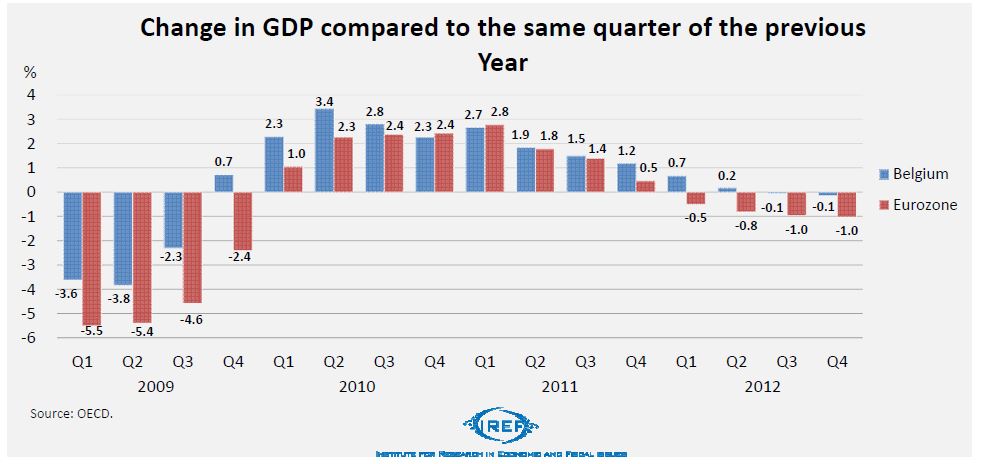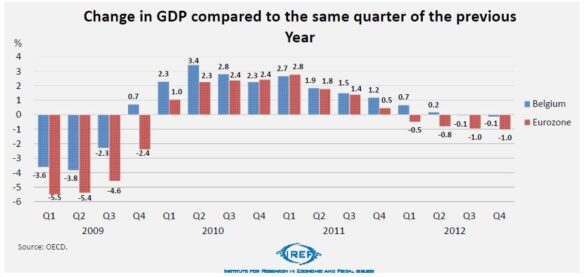Economic Growth without a Government?
Germany 2005, Belgium 2010-2011, USA 2013, Spain 2016: Even in well established democracies it can happen that governments lose a substantial part of their competencies or have to confine themselves to their representative tasks. There can be various reasons for this: in Spain a political dispute thwarts the formation of a new government since December 2015. Periodically, a “government shutdown” is looming before budget negotiations in the USA, meaning the discontinuation of all non-essential government agencies – 2013 some authorities actually had to stop working. After the Belgian elections 2010 the previous government had to stay in power provisionally for another 589 days due to the fragmented parliament not being able to find a majority. Also in July 2005, in Germany the coalition between the Social Democrats and the Greens under the leadership of Gerhard Schröder effectively ceased all government activities after a vote of no-confidence, until Angela Merkel formed a new government half a year later.
In such situations commentators are constantly warning that “political instability” will entail enormous economic costs, i.e. in the form of lower GDP growth, lower investments or higher unemployment. In hindsight, many of these worries turn out to be exaggerated. Neither during short time intervals – as in Germany after Schröder’s question of confidence 2005 – nor during longer time intervals – as in Belgium from 2010 onwards – did the economy suffer from the gridlock in government. In some cases the opposite turns out to be the case: Spain is growing since mid 2015 at the fastest pace in years.
These experiences provoke the question: Is the economy growing despite or because of the missing government? There are no empirical studies known to us, which identify the causal effect of a missing government on the economic development. Against all the commentator’s fears there exist good reasons that a missing government for a limited-time does not hurt its citizens economically and can even be beneficial to them.
Belgium: Without a Government through the Crisis
After the general elections in June 2010, the political parties in Belgium did not manage to form a new government for 589 days. The previous government stayed provisionally in power during that time, however, it saw itself reduced to a merely representative role. Its main task was to represent the country abroad. Domestically Belgium was practically ungoverned. There was no lack of warnings of a big economic crash and the top rating of Belgian debt was endangered.
The opposite occurred: Despite the euro crisis Belgium performed well. Its GDP grew by 2.7 and 1.8 percent in 2010 and 2011 respectively, faster than the Eurozone average. Occasionally, this was traced back to Belgium not being able to implement as many austerity measures due to the absent government. Neither extensive increases in taxes nor substantial reductions in government spending, which could have had a negative impact on the GDP in the short run, were implemented. Particularly skipping tax increases are very likely to have been advantageous for Belgians in the short- to medium-term.

An Absent Government does not mean Political Instability
There are indications that the malfunctioning of the state – caused by a coup, revolution or a constitutional crisis – leads to long-term damages to economic growth. The looming and actual collapse of the state, administration and the monopoly to the use of force make companies and consumers question the state’s ability to fulfil its core responsibilities – national defence, protection of its citizens and their property rights and enforcement of contracts. The reliable performance of these services is essential to complex social cooperation under the division of labor.
Despite characterising governmentless situations as times of political instability, the absence of a government does not imply the failure of the functioning of the state. The sole absence of a government does not mean that a state’s core responsibilities remain unfulfilled. In fact, a state can function surprisingly well without a government even for longer periods.
Apparently, the ability to form plans of the Belgian citizens did not suffer from the one year and a half gridlock in government. They kept up the economic activities and were able to rely on a working state apparatus.
Less Regulations without Governments
While the non-fulfilment of essential state functions contributes to higher uncertainty and decreasing economic activity, the same is not necessarily true for the discontinuation of other state activities. In addition to providing basic public goods, governments are very busy in creating new regulations. Many of those measures slow down economic growth and can extend the states’ competencies into areas in which it does not have any comparative advantages over private players. Although, even without a government already existing regulations will still be enforced, new ones will not or at least to a lesser extent be added.
Not only already implemented regulations but also the uncertainty of future measures can hurt economic growth. Companies and consumers who find themselves unable to predict the timing and extent of future regulations due to an activist government, reduce their economic activities. In a time of an absent or a merely provisional government, however, the citizen’s planning environment becomes more reliable.
Increasing Immunity through Decentralisation and Privatisation
In certain situations the absence of a government at the national level can nevertheless pose a problem, particularly when it lasts for a longer time period. This is the case when crises and changed conditions require swift political actions or the follow-up costs of the previous government’s decisions become unbearable.
However, societies can protect themselves from severe negative consequences from their government’s inability to act. Decentralising decision-making competencies softens the impact of a political gridlock on certain levels. For rather federal states a missing central government is particularly unproblematic.
Furthermore, the creation of additional private alternatives to public services can help to cushion the negative consequences of an absent government. This is especially the case when public services are only cancelled because they were initially monopolised by law – and not because the respective privately organised alternative would not be offered in absence of state services.
Even in countries like Spain and Belgium, which assign less authority to their different provinces then Germany assigns to its federal states, a temporary absence of the national government does not seem to extend into a state crisis. Neither do companies or consumers reduce their economic activities nor do essential services get cancelled. An extensive decentralisation of decision-making competencies could help to reduce the fears over a government absence not just during calm periods but also in the time of crisis.
This article is a translation of an original piece published on our German site and available at http://de.irefeurope.org/Wirtschaftswachstum-ohne-Regierung,a1171




